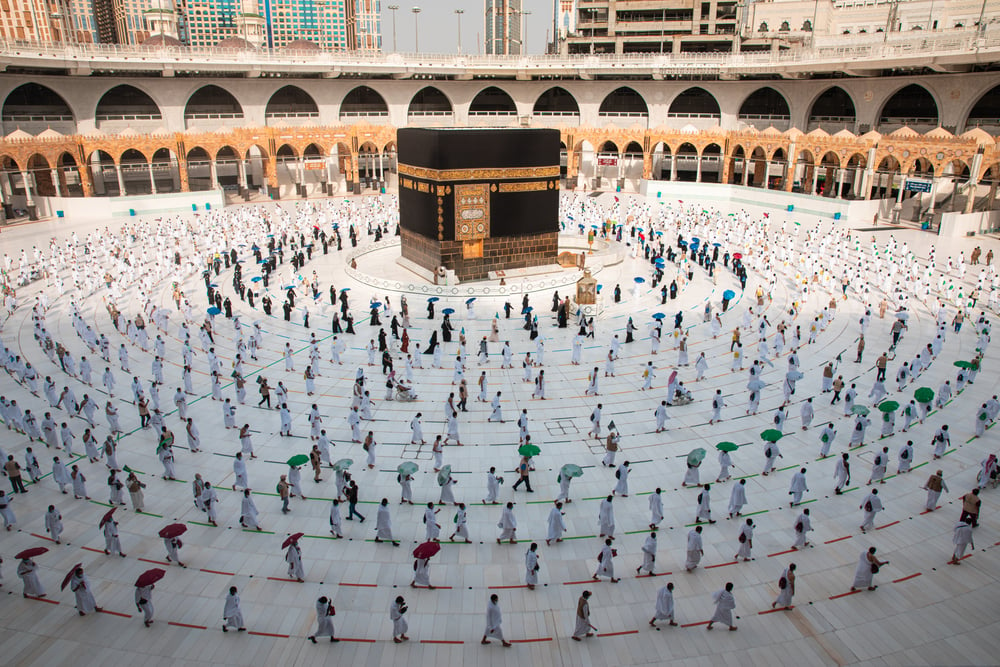Can I Face the Qibla’s General Direction?
Shafi'i Fiqh
Answered by Shaykh Irshaad Sedick
Question
My local Hanafi masjid faces 250° instead of 274°, which is the exact Qibla in my city. I know this slight difference is excusable in the majority of Schools except for the Shafi‘i School. So, if I follow the majority opinion in this matter, should I also take care not to be involved in Talfiq?
Is it valid for me to follow the minority opinion within the Shafi‘i school ascribed to Imam Shafi‘i (which is also the opinion of the majority of the Schools) that one far away from Mecca must merely face the direction of the Ka‘ba (jihat al-Ka‘ba)?
Answer
In the Name of Allah, the Most Merciful and Compassionate.
This is valid. Since most of the Schools of Sacred Law approve of facing the general direction of the qibla, you may follow this view, which would be valid for all prayers, and Allah knows best.
There would be no Talfiq in this case, and Allah knows best.
Facing the Direction of Prayer (Qibla)
Facing the direction of prayer (qibla) is a necessary condition (shart) for the prayer’s validity in the Shafi’i School. The only exceptions are praying in extreme peril and nonobligatory prayers performed while traveling. The requirement in the Shafi’i School is that the exact direction of the Ka’ba must be faced (to the extent possible). [Misri, ʿUmda Al-Salik]
Allah Most High says, “Indeed, We see you ˹O Prophet˺ turning your face towards the heaven. Now We will make you turn towards a direction ˹of prayer˺ that will please you. So turn your face towards the Sacred Mosque (in Mecca)—wherever you are, turn your faces towards it. Those who were given the Scripture certainly know this to be the truth from their Lord. And Allah is never unaware of what they do.” [Quran, 2:144]
The General Direction of Prayer
In another opinion ascribed to Imam Shafi‘i, one who is distant must merely face the general direction of the Ka‘ba (jihat al-Ka‘ba). This is supported by the hadith of the Prophet Muhammad (Allah bless him and give him peace), “What is between the east and the west is qibla.” [Tirmidhi; Ibn Maja]
This view was related from Imam Muzani (Allah have mercy on him). Because Imam Muzani related the view, some have mentioned that it is from the qawl jadid (Imam Shafi‘s final set of views). Abu al-Hasan al-Juri, the author of Murshid, preferred it (ikhtiyar). [Aḥmad and al-Rif‘ah, Kifayat al-Nabih]
This is also the view of Umar Ibn al-Khattab, Ali Ibn Abi Talib, Ibn al-Abbas, Ibn al-Mubarak, and Imam Abu Hanifa (Allah have mercy on them). [Nawawi, Majmu‘ Sharh al-Muhadhdhab]
In the Hanafi, Maliki, and Hanbali schools, the criterion for facing the direction of prayer is merely that some portion of the person’s face is directed towards the Ka’ba.
Additionally, Sh. Muhammad Ibn Abd Al-Rahman Al-Ahdal mentioned in a fatwa on the qiblah-direction: “It is not necessary to dispute the askew mosques which have prestige amongst the people who pray there. This is considering that Imam Malik opined that it is permissible to face towards (jihah) it. Imam Ghazzali and others strengthened the view. It is permissible to adopt (taqlid) the view, even if after the action was done (b’ad al-‘amal).” [Ahdal and Muhammad, ‘Umdat al-Mufti wa al-Mustafti]
Based on the above view, shared by most Schools of Law, it is lawful for you to pray at your local masjid, and your prayers (in this regard) will be valid, and Allah knows best.
I pray this is of benefit and that Allah guides us all.
[Shaykh] Irshaad Sedick
Checked and Approved by Shaykh Faraz Rabbani
Shaykh Irshaad Sedick was raised in South Africa in a traditional Muslim family. He graduated from Dar al-Ulum al-Arabiyyah al-Islamiyyah in Strand, Western Cape, under the guidance of the late world-renowned scholar Shaykh Taha Karaan.
Shaykh Irshaad received Ijaza from many luminaries of the Islamic world, including Shaykh Taha Karaan, Mawlana Yusuf Karaan, and Mawlana Abdul Hafeez Makki, among others.
He is the author of the text “The Musnad of Ahmad ibn Hanbal: A Hujjah or not?” He has served as the Director of the Discover Islam Centre and Al Jeem Foundation. For the last five years till present, he has served as the Khatib of Masjid Ar-Rashideen, Mowbray, Cape Town.
Shaykh Irshaad has thirteen years of teaching experience at some of the leading Islamic institutes in Cape Town). He is currently building an Islamic online learning and media platform called ‘Isnad Academy’ and has completed his Master’s degree in the study of Islam at the University of Johannesburg. He has a keen interest in healthy living and fitness.
